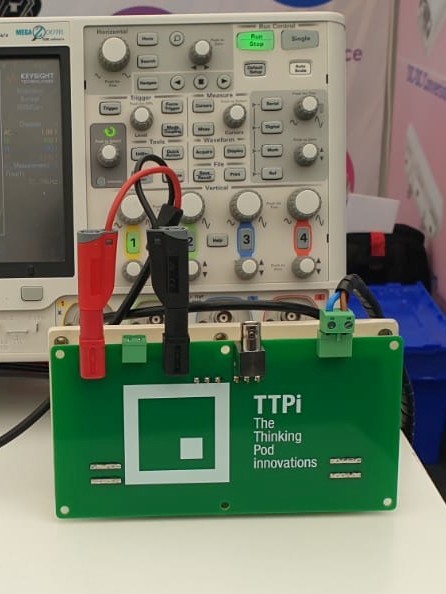University of Nottingham spin-out, The Thinking Pod innovations (TTPi), has secured £340,000 in its first investment round to commercialise pioneering power electronics technology, which reduce the environmental impact and cost of electric vehicles.
TTPi has developed groundbreaking technology in collaboration with the University of Nottingham, which will boost the efficiency and range of electric cars.
The company was founded in 2017 and to date, the firm has been funded through grants from Innovate UK, UKRI, Driving the Electric Revolution and income generated from commercial development agreements with partners such as Advanced Electric Machines, National Grid ESO and Infineon Technologies.
Now, the growing company has sought external equity investment for the first time. In a notable show of support for co-founders and directors Prof Lee Empringham, Dr Liliana de Lillo and their team, the new finance has been provided by fellow academics within the field of power electronics, the University of Nottingham, as well friends and family.
TTPi’s novel technology enables the creation of smaller, lighter, more efficient power converters and motor drive systems, which are essential in electric vehicles, aircraft, and any dynamic industrial processes that rely on electricity as a power source.
Currently, these components can be bulky and heavy, but using TTPi’s knowledge and applications allows them to be packaged into lightweight, compact units that will produce major savings in terms of precious raw material use, energy and cost, and deliver a better performance compared to anything currently available.
“The support for TTPi from fellow academics, friends and family is exceptional,” said company chairman David Whelan, who has over 35 years of business development experience, with particular expertise in expanding companies, while increasing company turnover and profitability.
“I have been working with spin-outs for 15 years and this shows what the investors feel about Lee and Liliana and their colleagues, as well as the future of the company, the technology it is developing and where that can go.
“We believe this technology and the products it supports will make a real difference in the transition to net-zero carbon emissions across multiple industrial sectors.”
This investment in TTPi will facilitate the commercialisation of cutting-edge components aimed at the electric vehicle industry. It will enable further development of TTPi’s DC-to-DC modular converter unit for use in electric vehicles, fund new staff and the creation of commercial licence agreements and patents.
The demand for improved power electronics components is huge, as all industrial sectors strive to manage the environmental impact of production and achieve net-zero greenhouse gas emissions.
The market for more compact and efficient electric vehicle (high-voltage DC-DC) power converters alone, is estimated to be $1.46 billion in 2024, rising to $2.82 billion in 2029.
The interest in and support for TTPi derives from the fact that its technology and modules have already been tested and field-trialled with excellent results.
“Industry is turning to electricity to meet the environmental challenges facing the planet and power electronics is the backbone of our increasingly electrified world,” said Prof Empringham, a leading member of the Power Electronics Machines and Control (PEMC) Research Institute and Standards Chair for the Industrial Power Converter Committee of the IEEE Industrial Application Society.
Prof Empringham explained that in an electric car, for example, a 400V or 800V battery is used to drive the wheels, but other systems like air conditioning and power steering require a lower voltage such as 42V and 12V systems.
“That’s where power converters come in, but their size and weight is currently a problem,” added Prof Empringham who has previously collaborated with leading global companies, including Boeing, GE Aviation, Infineon, Liebherr-Aerospace, Airbus, Ultra Electronics, Jaguar Land Rover.
“TTPi is ideally placed to help meet these challenges and supply these growing markets with state-of-the-art power dense, efficient and sustainable solutions, which includes power converters and motor drive systems.”
TTPi’s converters are lighter than existing products and are currently in prototype testing. TTPi is now working towards Technology Readiness Level (TRL) 6 and samples will be available for third-party testing in Q2 2025. The company plans to undertake a second investment round late next year.
In addition, TTPi recently unveiled its new advisory board, which includes Professor Jon Clare, Emeritus Professor of Power Electronics at the University of Nottingham and a leading international authority on the subject.
He is joined by Dr Simon Hart, an Honorary Associate Professor (Electrification of Transportation) and an Entrepreneur in Residence at the University of Nottingham, who has held senior positions at several technology companies, and Riona Armesmith, CTO at magniX, a company that is pioneering the development of electric aircraft.
TTPi was founded in 2017 and spun out of the University of Nottingham in 2020.



